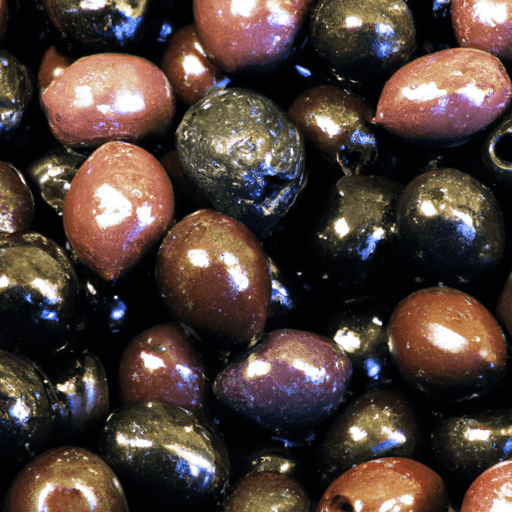All About Black Olives: A Savory Delight
If there’s one ingredient that can instantly transform a dish and bring a burst of flavor, it’s the humble black olive. With its rich, briny taste and unique texture, black olives have become a staple in many cuisines around the world. In this blog post, we will explore the distinct qualities and diverse uses of black olives in cooking, uncover their nutritional benefits, and dive into some fascinating historical tidbits.
Taste and Texture
Black olives, derived from the ripe fruit of the Olea europaea tree, possess a distinct flavor profile. They are often described as savory, slightly salty, and with a deliciously tangy undertone. The taste intensifies as the olives mature, resulting in a more pronounced flavor as they transition from green to black.
In terms of texture, black olives are soft and tender, with a smooth exterior and a buttery, melt-in-your-mouth consistency. They offer a delightful contrast to other ingredients in a dish and can add a touch of umami and depth to any recipe.
Culinary Uses
Black olives offer a myriad of possibilities in the culinary realm. They are incredibly versatile and can be enjoyed in various forms - whole, pitted, sliced, or pureed. Some common uses of black olives in cooking include:
1. Salads and Antipasti
Black olives are a cherished addition to salads or antipasti platters. Their vibrant color, strong flavor, and smooth texture complement fresh vegetables, cheeses, cured meats, and other salad components. Whether tossed in a Greek salad or scattered over a Mediterranean mezze platter, their presence adds a distinct burst of flavor.
2. Pasta and Pizza
In Italian cuisine, black olives play a crucial role in classic dishes like pasta puttanesca and pizza toppings. When paired with tomatoes, basil, garlic, and sharp cheeses, their hearty flavor shines through, creating a symphony of taste.
3. Tapenades and Spreads
Black olive tapenade, a spread originating from the sunny Mediterranean, is a luscious combination of olives, capers, anchovies, garlic, and olive oil. It can be slathered on bread, used as a dip, or incorporated in sandwich fillings. Furthermore, pureed black olives can be blended with aromatic herbs, garlic, and olive oil to create flavorful spreads to elevate a variety of dishes.
4. Stews and Braised Dishes
Black olives are often found in slow-cooked stews and braised meat dishes, where their robust flavor infuses the entire dish. Their brininess helps enhance the overall taste profile and can add a delightful Mediterranean touch.
5. Garnishes and Toppings
Whether sprinkled over roasted vegetables, grilled fish, or tucked into stuffed chicken breasts, black olives serve as an attractive and flavorful garnish. The pop of color they provide can elevate any dish, making it visually appealing and enticing.
Nutritional Benefits
Apart from their remarkable flavor, black olives also offer several nutritional benefits. They are a good source of monounsaturated fats - the healthy fats that contribute to heart health. Additionally, black olives contain Vitamin E, iron, calcium, and dietary fiber. Their high antioxidant content helps combat inflammation and promote overall well-being.
A Slice of History
The consumption of olives can be traced back thousands of years, making them one of the oldest cultivated crops in the Mediterranean region. Ancient civilizations revered olives for their significant place in religious rituals, and they were considered a symbol of peace and prosperity. From there, they spread across the globe, and today, black olives can be found in many cuisines worldwide.
It’s fascinating to think about the journey these small fruits have taken throughout history and how they’ve left an indelible mark on the culinary world.
In Summary
Black olives are a gift from nature, enriching our dishes with their robust flavor, unique texture, and vibrant color. Whether you enjoy them in a salad, spread, or as an accent to your favorite comfort food, black olives never fail to enhance the overall culinary experience. So, next time you’re in the kitchen, consider adding black olives to your creations and let their magic unfold.
Black Olives
Origin: Black olives are a type of olive, derived from the fruit of the olive tree (Olea europaea). The cultivation of olives dates back thousands of years and is believed to have originated in the Mediterranean region, particularly in Greece and Syria.
Common Uses: Black olives are commonly used in various culinary preparations and cuisines around the world. They can be eaten as a standalone snack or used as a key ingredient in many dishes, such as salads, pasta sauces, pizzas, and tapenades.
Nutritional Benefits: Black olives are a good source of healthy monounsaturated fats, which can help reduce inflammation and lower the risk of heart disease. They also contain essential vitamins and minerals, including vitamin E, iron, and calcium. Additionally, black olives are a rich source of antioxidants, which can help protect cells against damage caused by harmful free radicals.
Unique Properties: The black color of black olives is not naturally occurring. Most black olives available in stores are green olives that have been oxidized and fermented. The oxidation process changes their color from green to black. There are also naturally black olives, such as Kalamata olives, which are a popular variety known for their deep, rich flavor.
Historical Significance: Olives have been a significant part of Mediterranean culture and cuisine for thousands of years. They held symbolic importance in ancient civilizations, such as the Greeks and Romans, and were associated with peace, fertility, and divine favor. Olives and olive oil were highly valued commodities and had various uses beyond culinary purposes, including in religious rituals, as fuel for lamps, and as a beauty product.
Note: While black olives offer various potential health benefits, consumption in moderation is recommended due to their high sodium content.




Use the share button below if you liked it.
It makes me smile, when I see it.